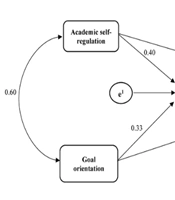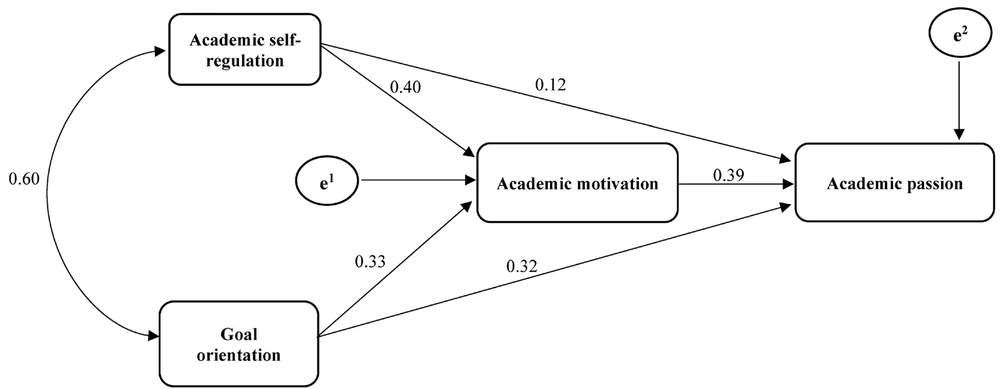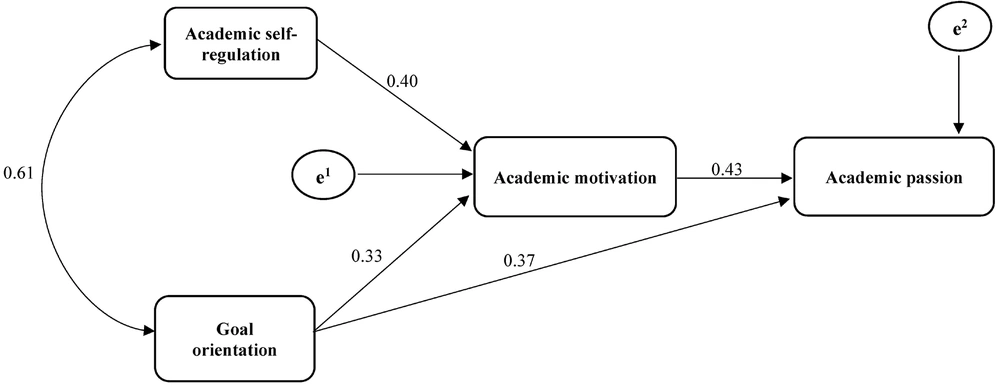1. Background
Academic success in medical education is influenced by students' beliefs about their abilities and their attributions for their performance. Self-handicapping behaviors, a growing concern in educational psychology, pose a significant obstacle to student self-efficacy and academic achievement (1). Defined as deliberate strategies employed to pre-empt responsibility for academic failures (2), self-handicapping behaviors can have detrimental effects on learning processes and academic outcomes (3). By attributing failures to external factors and successes to internal ones, students exhibiting self-handicapping behaviors can hinder their academic progress (4).
Self-handicapping refers to the creation of obstacles or excuses to avoid failure. In educational settings, students may engage in self-handicapping behaviors to protect their self-esteem and avoid negative judgments. Consequently, self-handicapping can occur in any situation where an individual's ability is perceived as threatened. Universities and classrooms provide fertile ground for the manifestation of self-handicapping behaviors (5). In such educational settings, students are constantly confronted with situations where their abilities and intelligence are subject to the judgment of others. Research has shown that academic self-handicapping serves as a preemptive and self-regulating strategy employed to cope with anticipated poor performance on academic tasks (6).
Medical education presents significant stressors that can negatively impact student well-being and academic performance (7). To address this concern, educational research prioritizes understanding factors that contribute to student success in higher education (8). One such factor is "academic passion" (9). Defined as a long-lasting, energizing state focused on a specific subject, like medicine (10), academic passion is considered an internal driver of student engagement (11). Its study emerged from concerns about student disengagement and low motivation (12). Recently, research has explored how the educational environment can influence academic passion (13). This suggests that fostering a supportive learning environment can motivate students toward academic goals, enhance well-being, and ultimately improve performance.
Academic passion itself can also be influenced by various factors. One component that may be associated with students' academic passion is goal orientation (14). Goal orientation refers to a system of beliefs and emotions that shape students' academic goals and behaviors (15, 16). Three key types of goal orientation are identified: Mastery, performance, and avoidance. Students with a mastery orientation are driven by a desire to understand and gain competence in the subject matter (17). They view errors as learning opportunities, exhibit positive self-talk, and dedicate more time to learning. In contrast, performance-oriented students prioritize demonstrating their competence to others and avoid challenging tasks. Their focus lies on outperforming peers and attaining high grades. Finally, avoidance-oriented students primarily aim to avoid failure, lacking intrinsic interest in learning and focusing on minimizing perceived incompetence (18).
Self-regulation, the mental efforts exerted to control internal states, processes, and functions to achieve higher goals (19), can be a double-edged sword for medical students. On the one hand, effective self-regulation can help students manage stress, prioritize tasks, and maintain focus, which are essential for academic success. On the other hand, excessive self-regulation or maladaptive self-regulation strategies can contribute to self-handicapping behaviors (20). For example, medical students who engage in excessive self-regulation may set unrealistic expectations for themselves, leading to feelings of inadequacy and a fear of failure. In response to these negative emotions, students may engage in self-handicapping behaviors to protect their self-esteem and avoid the potential for failure. Additionally, maladaptive self-regulation strategies, such as procrastination or avoidance, can hinder academic progress and create obstacles that can be used as excuses for poor performance (21).
Academic motivation, on the other hand, is significantly associated with passion-related behaviors in students (22). Educational psychology and learning studies have consistently demonstrated the connection between learning motivation and academic success. Learning is an active process that necessitates deliberate and conscious effort (23). If a high-ability student lacks focus and attention during study sessions and fails to exert effective effort, they may struggle to achieve academic success. To maximize the benefits of a curriculum, the classroom environment must foster student engagement and participation in learning activities (24).
Given the significance of this topic and the existing knowledge gap in medical schools, particularly regarding the role of academic motivation in mediating the relationship between self-handicapping behaviors and academic passion, this study investigated the relationship between academic self-regulation, goal orientation, academic motivation, and academic passion among medical students exhibiting self-handicapping behaviors. By addressing this gap, this study contributes to a deeper understanding of the factors influencing academic success in medical students and provides insights for targeted interventions to support students at risk of self-handicapping.
2. Objectives
This study aimed to examine the interconnections between academic self-regulation, goal orientation, academic passion, and academic motivation among medical students exhibiting self-handicapping behaviors. Specifically, the study sought to elucidate the mediating role of academic motivation in the relationship between these variables.
3. Methods
This study adopted a descriptive, correlational design. The target population encompassed all undergraduate medical students exhibiting self-handicapping behaviors at Jundishapur University of Medical Sciences in Ahvaz, Iran, in 2022. A purposive sampling approach was employed, distributing questionnaires to the entire student body (n = 800). After excluding incomplete responses, the final sample comprised 204 students who met the inclusion criteria. This sample size is considered adequate for the present study, as it allows for robust statistical analyses and provides a representative sample of the target population. The inclusion criteria included being an undergraduate student, scoring above the mean on the self-handicapping behaviors questionnaire, and providing informed consent. Students unwilling to participate or failing to complete the questionnaires were excluded. To ensure the ethical conduct of this research, informed consent was obtained from all participants, and their privacy and confidentiality were protected.
3.1. Instruments
3.1.1. Academic Passion Scale
Developed by Fredricks et al. (25), the Academic Passion Scale (APS) consists of 14 items measuring three subscales: Behavioral (items 1 - 4), emotional (items 5 - 10), and cognitive (items 11 - 14). Responses are rated on a 5-point Likert Scale (ranging from never = 1 to always = 5). The APS yields scores ranging from 14 to 70, with higher scores indicating greater levels of academic passion. The scale's reliability was reported as 0.86 by the authors. In Iran, after translation and standardization, Izadpanah (26) reported a reliability coefficient of 0.95 for the scale. In the present study, the reliability was calculated using Cronbach's alpha, yielding a value of 0.95.
3.1.2. Goal Orientation Scale
The 20-item Goal Orientation Scale (GOS) by Bouffard et al. (27) measures mastery, performance-approach, and performance-avoidance orientations using a 5-point Likert Scale (1 = strongly disagree, 5 = strongly agree). The authors reported good internal consistency (α = 0.75 - 0.88) (27). Similarly, the present study found acceptable reliability (α = 0.79 - 0.83).
3.1.3. Academic Self-Regulation Scale
Academic self-regulation was measured using the 14-item Academic Self-Regulation Scale (ASRS) by Bouffard et al. (27) (1 = "doesn't match," 5 = "matches completely"). It covers cognition, metacognition, and motivation (scores range from 14 to 70). The scale demonstrated good reliability (α = 0.90) (28), with this study finding similar results (α = 0.87).
3.1.4. Academic Motivation Scale
This study employed Harter's (29) 33-item Academic Motivation Scale (AMS) to assess students' intrinsic and extrinsic academic motivation. The AMS utilizes a bipolar Likert scale (1 = never, 5 = almost always), with each question contrasting intrinsic and extrinsic motivational aspects. Participants select the response that best reflects their usual experience. Bahrani (30) reported a Cronbach's alpha coefficient of 0.85 for the AMS, and the present study obtained a similar value of 0.90, indicating acceptable internal consistency reliability.
3.2. Data Analysis
Data were analyzed using SPSS version 27 for descriptive statistics (means and standard deviations) and Pearson's correlation coefficients. Structural equation modeling (SEM) was conducted using AMOS version 24. Statistical significance was determined using an alpha level of 0.05 for both correlation and SEM analyses.
4. Results
The mean age of the participants was 21.07 ± 2.38 years. A total of 111 participants (54.4%) were female, and 93 participants (45.6%) were male. The relatively young age of the participants is consistent with the population of medical students, and the gender distribution is fairly balanced, reflecting the demographics of medical education. The means, standard deviations (SD), skewness, and kurtosis of the study variables are presented in Table 1.
| Variables | Mean ± SD | Skewness | Kurtosis |
|---|---|---|---|
| Academic passion | 42.36 ± 6.98 | -0.02 | 1.16 |
| Goal orientation | 60.07 ± 11.23 | -0.08 | 0.92 |
| Academic self-regulation | 42.42 ± 7.98 | 0.01 | 0.17 |
| Academic motivation | 99.09 ± 15.80 | 0.02 | -0.59 |
The study revealed significant positive correlations between all the variables investigated: Academic passion, goal orientation, academic self-regulation, and academic motivation (P < 0.01) (Table 2). These findings suggest that students with higher levels of academic passion tend to exhibit stronger goal orientation, greater academic self-regulation, and higher levels of academic motivation. Similarly, students with strong goal orientation, academic self-regulation, or academic motivation are more likely to report higher levels of academic passion. Based on these correlations, a model was proposed to predict academic passion using these variables (Figure 1). The model depicts how academic self-regulation, goal orientation, and academic motivation are hypothesized to positively influence academic passion.
Based on the fit indices in Table 3 (RMSEA = 0.258), the initial model required modification. Specifically, removing the path from academic self-regulation to academic passion improved the model fit. The revised model is presented in Figure 2. The final model exhibited a satisfactory fit with an RMSEA of 0.001, indicating good model fit.
| Fit Indicators | χ2 | df | (χ2/df) | TLI | RFI | CFI | NFI | RMSEA |
|---|---|---|---|---|---|---|---|---|
| Initial model | 15.57 | 22 | 0.71 | 0.91 | 0.99 | 0.93 | 0.95 | 0.258 |
| Revised model | 16.70 | 23 | 0.73 | 0.99 | 0.99 | 0.97 | 0.98 | 0.001 |
Abbreviations: χ², chi-square; TLI, Tucker-Lewis Index; RFI, Relative Fit Index; CFI, Comparative Fit Index; NFI, Normed Fit Index; and RMSEA, root mean square error of approximation.
Path analysis (Table 4) revealed a surprising lack of direct effect from academic self-regulation on academic passion (β = 0.12, P = 0.290). However, goal orientation directly influenced academic passion (β = 0.37, P = 0.001). Interestingly, both goal orientation (β = 0.34, P = 0.001) and academic self-regulation (β = 0.40, P = 0.001) positively predicted academic motivation, which in turn exerted the strongest direct effect on academic passion (β = 0.43, P = 0.001). Furthermore, significant indirect effects were identified, with academic self-regulation and goal orientation influencing academic passion through academic motivation (β = 0.11, P = 0.010; β = 0.07, P = 0.037, respectively). These findings suggest a mediating role of academic motivation in the relationships between the other variables and academic passion.
| Path | Revised Model | |
|---|---|---|
| β | P | |
| Academic self-regulation → academic passion | 0.12 | 0.290 |
| Goal orientation → academic passion | 0.37 | 0.001 |
| Academic self-regulation → academic motivation | 0.40 | 0.001 |
| Goal orientation → academic motivation | 0.34 | 0.001 |
| Academic motivation → academic passion | 0.43 | 0.001 |
| Academic self-regulation → academic passion through the academic motivation | 0.11 | 0.010 |
| Goal orientation → academic passion through the academic motivation | 0.07 | 0.037 |
5. Discussion
This study aimed to investigate the relationship between academic self-regulation and goal orientation with academic passion in medical students exhibiting self-handicapping behaviors, considering the mediating role of academic motivation. Contrary to expectations, the direct relationship between academic self-regulation and academic passion was not significant. This finding contradicts previous research (31) that has demonstrated the predictive role of goal orientation in academic passion. The study revealed a surprisingly weak correlation between academic self-regulation and academic passion. This finding may be attributed to the complex interplay of intrinsic motivational factors that contribute to academic passion, including enjoyment and a desire for mastery. While self-regulation strategies can enhance the learning process by making tasks more enjoyable and managing the learning environment effectively, they may not directly influence the profound sense of purpose and intrinsic enjoyment that characterizes academic passion.
As suggested by the authors, other factors, such as goal orientation and academic motivation, could serve as mediators between self-regulation and academic passion (31). This finding underscores the multifaceted nature of academic passion and suggests that interventions aimed at fostering both self-regulation and these motivational factors may be most effective in cultivating a love of learning.
This study aligns with prior research (32) by demonstrating a positive association between goal orientation and academic passion. Students with learning and performance goals (mastery and performance-approach orientations) tend to be highly motivated learners who achieve well and persist in their studies (33). This suggests a connection between goal orientation and academic passion. Conversely, students with avoidance goal orientation often experience anxiety, disinterest, and demotivation, leading to decreased academic passion and potentially hindering academic progress (32). Notably, both learning and performance-oriented goals can be positive for medical students, as even competition in a demanding environment can foster academic progress, especially in today's society where educational attainment is valued for social integration.
The study further revealed a statistically significant relationship between academic motivation and academic passion. This finding aligns with previous research (9), which has consistently demonstrated the positive association between academic motivation and academic passion. This relationship can be explained by recognizing that engagement in academic activities requires academic motivation and a sense of emotional or cognitive passion for learning and the learning environment. Academic passion reflects the strength of behavior and the emotional and cognitive quality of students' engagement in learning activities. Therefore, consistent with the findings of Mohammadi Bytamar et al. (33), individuals who are unable to accept and manage their negative emotions and experience emotional dysfunction are more likely to fear and avoid failure. Consequently, this inability to manage emotions, potentially stemming from fear of failure, can lead to decreased academic motivation, negatively impacting all aspects of academic passion.
Another significant finding emerged from this study: The mediating role of academic motivation in the relationship between academic self-regulation and academic passion. While the direct relationship between academic self-regulation and academic passion was not significant, the indirect relationship was found to be meaningful. This suggests that academic self-regulation only influences academic passion when it first leads to an increase in academic motivation among students. In general, the presence of academic self-regulation in students is associated with increased academic motivation and can enhance academic passion.
In this context, it is natural to assume that multiple factors influence the academic passion of medical students exhibiting self-handicapping behaviors. Some of these factors may promote academic passion, while others may undermine it. According to expectancy-value theory, the belief that academic progress may not hold instrumental value can develop among medical students. This theory posits that the tendency to approach a natural stimulus is the product of two cognitive constructs: Expectancy and value. Expectancy refers to the belief that performing a specific behavior will produce a specific outcome, while value refers to the anticipated satisfaction an individual derives from a particular environmental stimulus. Consequently, the resulting expectancy-value force diminishes, leading to a decrease in individual motivation.
On the other hand, one of the components of motivation is the sense of self-efficacy—the belief in one's own effectiveness. When students feel ineffective in society, despite their desire to learn, they may lack sufficient motivation. Therefore, it can be concluded that academic motivation effectively plays the role of a mediating variable in the relationship between academic self-regulation and academic passion.
The study also revealed a significant mediating role of academic motivation in the relationship between goal orientation and academic passion. While the direct relationship between goal orientation and academic passion was found to be meaningful, the indirect relationship further demonstrated that goal orientation enhances academic passion among medical students exhibiting self-handicapping behaviors by increasing their academic motivation. An examination of the impact of different goal orientations on academic progress revealed that mastery-oriented students exhibit the highest levels of academic passion, while avoidance-oriented students exhibit the lowest. Additionally, performance-oriented students demonstrate higher levels of academic passion compared to learning-oriented and avoidance-performance-oriented students. Accordingly, learning and performance-oriented goal orientations are more beneficial for academic progress than avoidance-oriented goal orientations. Individuals with performance-oriented goal orientations strive to prove their competence in competitive environments. In such settings, objective criteria serve as the most apparent and accessible measures for evaluating individuals, and all their efforts and focus are directed toward achieving this goal (16).
This study acknowledges several limitations that may have influenced its findings and generalizations. The emotional and psychological state of participants during the completion of questionnaires could have impacted their responses, a factor beyond the control of the researchers, potentially introducing bias into the data. The use of self-report measures may have introduced social desirability bias, potentially affecting the accuracy of participants' responses. Self-reported data may be susceptible to distortion due to individuals' inclination to present themselves in a more favorable light. Furthermore, the study's sample was restricted to medical students exhibiting self-handicapping behaviors, limiting the generalizability of the findings to other student populations and educational settings.
5.1. Conclusions
The study revealed that goal orientation, academic self-regulation, and academic motivation are interconnected, with the latter two indirectly influencing academic passion. Students with stronger goals and self-regulation are more likely to be motivated, fostering a love of learning. Future research should explore strategies to enhance these factors in various educational contexts, investigate their interplay with individual differences and cultural factors, and establish stronger causal relationships through longitudinal studies. Understanding these dynamics can help educators develop culturally responsive strategies to support students' academic success.


